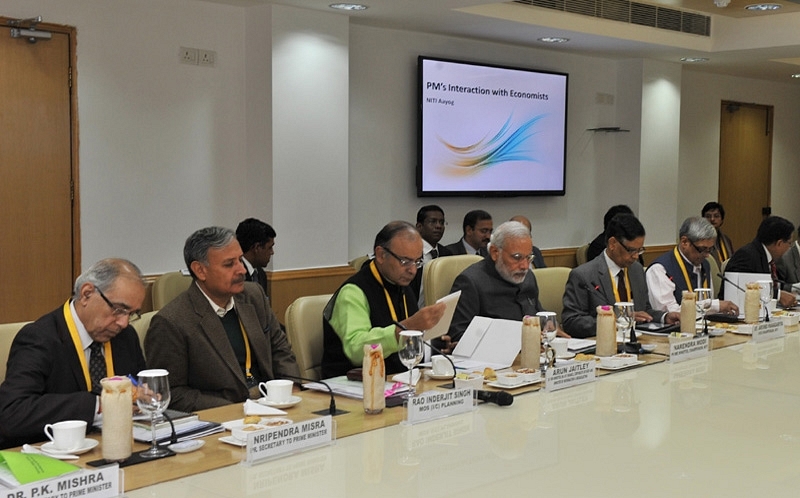Economy
Too Disruptive And Needless: Why Changing Fiscal Year Is Not A Good Idea
- What needs changing is our budgetary practices, and not the financial year itself.
- Exchanging one for another is a wasteful exercise when the government’s focus should be on getting the economy out of the ditch.

Niti Aayog
In NITI Aayog’s third governing council meet yesterday (24 April), Prime Minister Narendra Modi batted for a change in fiscal year (FY) from April-March to January-December. He suggested that the states take the lead in changing the financial year.
Last year, the central government had set up a four-member committee headed by former Chief Economic Advisor Shankar Acharya to examine the feasibility and desirability of changing the financial year.
If the committee does suggest making the change, it will be too disruptive as it would change the budget presentation month, companies may also need to change their accounting years to be in line with this and tax filing dates for companies and individuals would change.
Do The Benefits Outweigh The Risks?
The Prime Minister reasons that advancing the budget session will make funds available for various schemes so that they could be utilised in time, especially for farming before the monsoon arrived.
In 1984, the Congress government had also appointed a committee under L K Jha to examine the fiscal year change, and monsoon figured prominently in its reasoning for changing the FY. It was argued that in February, the government has no idea how the monsoon will fare, and so the budget will be presented without knowing anything about a big part of the economy.
But, this argument does not make much sense for budgets are presented for the next year. If budget comes in October, you may know how the last monsoon has fared, but not the next one, which will impact the economy in the second half of the financial year for which the budget is to be presented.
In any case, the share of agriculture to the gross domestic product (GDP) is declining every passing year, and whatever be the financial year, governments have to act if farm distress is going to happen. The budget cannot anticipate everything, and good financial management means responding to the needs of the economy.
The Goods and Services Tax (GST) which is being implemented from 1 July is itself very disruptive and it may not be worth having two disruptions running simultaneously.
Once the GST comes into being, there will be little need to tinker with tax rates year after year, which means revenues will be more or less on autopilot, and expenditure is what needs better management.
What needs changing is our budgetary practices, and not the financial year itself. Whatever financial year you choose will bring some benefits and some losses. Exchanging one for another is a wasteful exercise when the government’s focus should be on getting the economy out of the ditch. A change in the financial year would be needlessly disruptive at a time when fixing the economy should be the priority.
Support Swarajya's 50 Ground Reports Project & Sponsor A Story
Every general election Swarajya does a 50 ground reports project.
Aimed only at serious readers and those who appreciate the nuances of political undercurrents, the project provides a sense of India's electoral landscape. As you know, these reports are produced after considerable investment of travel, time and effort on the ground.
This time too we've kicked off the project in style and have covered over 30 constituencies already. If you're someone who appreciates such work and have enjoyed our coverage please consider sponsoring a ground report for just Rs 2999 to Rs 19,999 - it goes a long way in helping us produce more quality reportage.
You can also back this project by becoming a subscriber for as little as Rs 999 - so do click on this links and choose a plan that suits you and back us.
Click below to contribute.
Latest